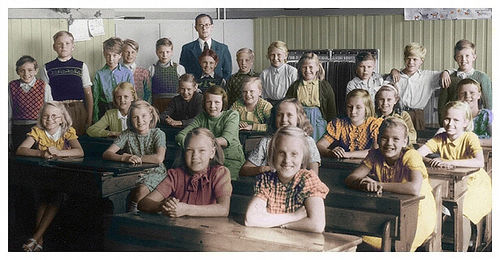The foundation of our educational system is the repetition of factual knowledge. Classrooms are filled with the chanting of multiplication. Useful and necessary one might think, but is it? What we need to know is not that “three times four equals 12” but that one grouping ‘times’ another grouping results in a new grouping via the mechanism of multiplication. What we need to understand is what ‘times’ means. I was never very good at rote learning, the chants of multiplication or topography were songs to me. The lyrics no more relevant than Mary having a little lamb. Teaching the principle instead of the several outcomes must be a better way to do it.
 “This is rote learning, the bane of modern existence[… ] simple remembering without reliance on an understanding of why or on an internal structure.”
“This is rote learning, the bane of modern existence[… ] simple remembering without reliance on an understanding of why or on an internal structure.”
The design of everyday things (Norman, 1988/2002).
Like the Ford-factory the basis of our schooling system is that of the conveyer belt. A one size fits all approach in which rote learning represents the nuts and bolts that allow us to mount, with simple instructions, the bodywork of factual knowledge onto the framework of any child. Out comes a generally tested product that can be “any colour as long as it’s black”. Society doesn’t need more of the same; it hasn’t for some time. Society doesn’t need dependable cars than can drive on paved roads, it needs a vehicle that can traipse any geology it encounters. Could be a car, could be a plane, might be a dolphin and chances are high that the best fit is going to be something that I cannot think of because basically I am a Ford-mobile too.
We do a lot more rote learning than just the chanting of numbers. We learn facts; we teach one-dimensional knowledge and test by stating the outcome. We learn the names of countries, places and people; declarative statements. If you were keen on biology you can probably tell me the six types of feather on a magpie but have you ever been asked to describe the birds’ experience of flight?
I am terrible at naming places and countries because as soon as I learned how to interpret a map and found out that every atlas has an index I no longer saw the point in stuffing my head with these nonsensical lists of names when there was a perfectly good list out there. Nowadays, Google is the index of everything. Filling impressionable heads with whatever listings of fact is a terrible waste of space. What would be useful is teaching them to actively seek knowledge. How and where to find the facts, how to judge information, possible interpretations of ‘the facts’ and how to apply them.
Which lands us in the middle of How? How do we teach these things (and how do we test them)? If we want to instil the process instead of providing declarative statements; what do we do? Perhaps we should question the thinking process and then trust the outcome. The educational paradigm must be redefined as a continuous interaction between teacher and pupil instead of the sender-receiver model it is now based on. At the moment, this is not what we teach our teachers.
Have peek at what changes possibly -hopefully- lie ahead with 21st century skills
or join the discussion here (Dutch)
